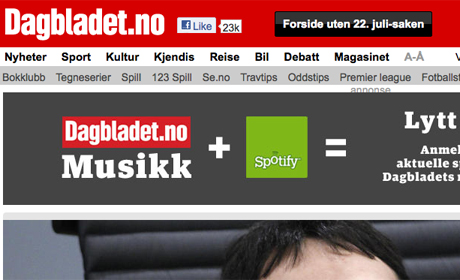Norwegian media giant Schibsted this morning announced that it’s paying £30m to take a 35 per cent stake in the Swedish edition of Metro International’s free newspaper.
In what is a key freesheet market the former rivals have forged a partnership to collaborate on advertising sales with the new company offering advertisers the chance to reach 4.2 million readers across the Metro and Schibsted paid-for dailies Aftonbladet and Dagbladet.
In February, Metro International CEO, Per Mikael Jensen, discussed his company’s strategic goals with Journalism.co.uk saying that consolidation and online innovation would be key for the development of his newspapers, in what he called the ‘freesheet 2.0 phase.’
“We are entering a freesheet 2.0 phase where we are consolidating our core business and looking at more ways to attract readers,” said Jensen, who succeeded Pelle Törnberg as head of Metro in 2007.
In Sweden, this consolidation will mean Schibsted will stop publication of its free paper Punkt SE with immediate effect so that the new joint venture can focus print advertising around a single free title.
The deal has similarities with the one Metro struck at the end of 2007, when it sold 60 per cent of its Czech operation to its competitor Mafra.
The freesheet giant is currently undergoing a strategic review, and when Journalism.co.uk spoke to him, Jensen said we could expect more deals of this nature.
Today, Jensen refused to rule out further consolidations when questioned by Danish media and said he expected dramatic changes in the Danish newspaper market in the coming months (but refused to go into details).
“We do not just sit there and wait for the strategic review to be completed, but implement strategy from day to day. Strategy is something we evaluate each month. Those who believe the strategic review we now are in the middle of will become some sort of bible, will be disappointed,” said Jensen in the interview with Journalism.co.uk.
In addition, Metro is looking to attract more readers online. It’s launching new versions of its websites in all its markets – it recently launched online for the first time in France – and will consolidate some of its editorial activities by creating an internal news agency in London which will serve all its editions.
Jensen is behind Metro’s new developments and alliances but he remains as pessimistic as ever about the future of paid-for printed newspapers.
“I would be very surprised if more than 25 per cent of today’s paid-for newspapers exist in ten years. Of the newspapers that will survive, many of them will be published online only, or make its paper edition free,” Jensen said.
The two newspaper giants may have forged a partnership in Sweden but they remain embroiled in a head-to-head competition over their market leading freesheets in France and Spain.
However, Metro International still has a lot of work to do to convince investors that its business model – the company is still loss-making even though it narrowed its first quarter net loss to £5.1 m – has a profitable future.

